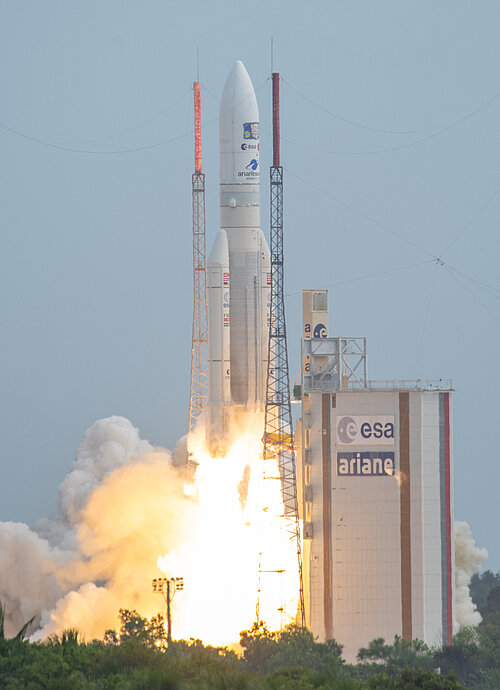The JUICE mission has begun its journey into the Jovian system. After yesterday’s original launch had to be postponed due to bad weather, today was the day: The Ariane 5 launch vehicle launched the 6.1-tonne research satellite from Kourou spaceport in French Guiana into the solar system at 2:14 p.m. Central European summer. In the afternoon, the European Space Agency was also able to report the successful detection of the solar panels.
The Jupiter Icy Moons Explorer mission, or JUICE for short, will be on the move for eight years before it reaches the Jovian system in July 2031. The goal of the European Space Agency (ESA) mission is to study the three icy moons of Jupiter – Callisto, Europa and Ganymede – and learn more about the size and composition of their ice-covered oceans.
Austrian research examining the oceans of icy moons
Also on board the probe are three contributions from the Graz Institute for Space Research of the Austrian Academy of Sciences (ÖAW): In collaboration with the Institute for Experimental Physics at Graz University of Technology, OeAW researchers have developed a new quantum interferometer magnetometer. In addition, OeAW has performed calibration of radio wave receiving antennas and is involved in particle spectrometer scientific expertise.
“The European mission to Jupiter’s magnificent icy moons is amazing, all the conditions for life could be provided there. Local basic research makes significant contributions to the success of this future project. When JUICE reaches Jupiter in 2031, measurements with instruments from Austria will show what it looks like Watery oceans beneath icy moons,” says Heinz Fassmann, president of the Austrian Academy of Sciences (ÖAW), who announced the launch of the ESA rocket in a live broadcast.
Christian Helling, Director of the Institute for Space Research at OeAW adds: “Since the discovery of the first exoplanet, it has been clear that studying the planets of our solar system is key to understanding the diversity of planets in the Milky Way and Earth as the basis for our life. By studying the Jovian system, we also hope to Gain new insights into the impressively dynamic atmosphere of Jupiter itself.”

“Social media evangelist. Baconaholic. Devoted reader. Twitter scholar. Avid coffee trailblazer.”








More Stories
These brands are most vulnerable to phishing scams
Apple Maps Now Has a Web Version and Wants to Challenge Google Maps
Best AirDrop Alternatives for Android